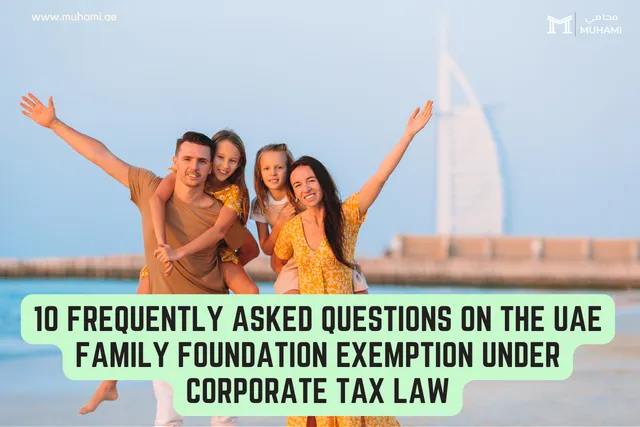10 Frequently Asked Questions on the UAE Family Foundation Exemption Under Corporate Tax Law

-
What is the Family Foundation Exemption under UAE Corporate Tax Law?
The Family Foundation Exemption (FFE) under the UAE Corporate Tax Law (Federal Decree-Law No. 47 of 2022, as amended) (CT Law) allows a qualifying entity to apply to be treated as a fiscally transparent entity. This means the entity itself is not subject to corporate tax (CT); instead, its income is taxed in the hands of its beneficiaries. This exemption is codified under Article 17 of the CT Law and further clarified by a series ministerial decisions and guidelines.
-
Which legal entities can qualify for the FFE?
The FFE applies to juridical persons such as foundations, incorporated trusts, and similar entities that meet the requirements of Article 17(1) of the CT Law. These entities must be established for the purpose of holding and managing assets for the benefit of natural persons or public benefit entities.
Unincorporated trusts (e.g., DIFC or ADGM trusts) are treated as fiscally transparent by default and do not require a formal application to be recognised as such. They must still meet all the requirements of Article 17(1) of the CT Law to qualify as a Family Foundation.
-
Can a Limited Liability Company (LLC) or similar entity benefit from the FFE?
Yes, under certain conditions. Article 5(2) of Ministerial Decision No. 261 of 2024 allows any juridical person to apply for the FFE if:
However, compliance with the no-business activity requirement under Article 17(1)(c) may be particularly challenging for LLCs and similar entities, as they typically hold trade licenses which permits to carry out business. In practice, even an unused trade license may trigger concerns about FFE eligibility.
It remains unclear whether an LLC can benefit from the FFE in its own capacity, particularly in the case of entities such as ADGM Special Purpose Vehicles, DIFC Prescribed Companies, or Jebel Ali offshore companies – all of which are structured as LLCs but function more like asset-holding vehicles (akin to foundations or trusts), and do not hold trade licenses or have the capacity to conduct business operations within the UAE.
- It is wholly owned and controlled by a foundation, trust, or similar entity that qualifies as a Family Foundation;
- It meets the conditions under Article 17(1) of the CT Law, including not conducting a business activity.
-
How can I prove that my entity is owned by an unincorporated trust?
In these structures, the trust property is typically held in the name of the trustee. The trustee may be one or more natural persons, juridical persons (such as a corporate trustee), or a combination of both. Although legal ownership rests with the trustee, the trust is considered to hold the assets for the benefit of its beneficiaries.
For the purposes of applying the FFE to an entity owned by such a trust, the Federal Tax Authority (FTA) will automatically deem the ownership and control requirement under Article 5(2)(a) of Ministerial Decision No. 261 of 2024 to be satisfied, provided that adequate disclosure is made to evidence the existence and structure of the unincorporated trust.
This means that a company held under a properly disclosed and documented unincorporated trust will be treated as wholly owned and controlled by a Family Foundation for the purposes of FFE eligibility.
-
What are the conditions under Article 17 that must be met to obtain the FFE?
The applicant entity must meet all five of the following conditions under Article 17(1) of the CT Law:
- (a) Beneficiary condition – The entity must be established for the benefit of identified or identifiable natural persons or public benefit entities. For example, an ADGM foundation benefiting the founder’s children or grandchildren (including unborn ones) would meet this requirement.
- (b) Principal activity condition – Its primary activity must be the receipt, holding, investment, or management of assets or funds linked to savings or investments.
- (c) No business activity condition – It must not carry out any activity that would constitute a business or business activity if conducted directly by its founder or beneficiaries (see Q6).
- (d) No tax avoidance condition – The main or principal purpose of the entity must not be the avoidance of CT. Applying for the FFE is not in itself deemed tax avoidance. Rather, the exemption is designed to ensure fairness for those carrying out activities which would otherwise not be taxed in their personal name.
- (e) Any other conditions as prescribed by the Ministry of Finance – This includes administrative and compliance-related obligations that may be issued by the FTA from time to time. Note that specific distribution requirements may apply where beneficiaries are public benefit entities; these are not addressed in this article.
-
What counts as a business activity and how does it impact eligibility?
Under Article 17(1)(c), a Family Foundation must not carry out any activity that would constitute a business or business activity if conducted directly by a natural person founder or beneficiary.
Business activity is defined in Cabinet Decision No. 49 of 2023 and generally includes any licensed activity or those which would otherwise be treated as a business under UAE law. Income from the following activities are not considered business activities:
Examples:
- Wages from Employment.
- Personal Investment Income.
- Real Estate Investment Income.
- Renting one or more residential units without a license = Not a business / Real Estate Investment Income.
- Running a Motel = Trade License Required / CT Taxable Business.
-
Does being granted the FFE mean I no longer need to worry about taxes?
Unfortunately, no.
While the entity itself is treated as fiscally transparent, individual tax obligations remain. In the UAE, most individuals will not owe CT on income from wages, personal investments; and/or real estate. This means that if your Family Foundation holds assets that yield these types of income, and you are a UAE tax resident, it is unlikely you and your entity will need to worry about taxes if the FFE for your entity is approved.
However, if you personally earn income which partly qualifies as non-exempt income from commercial activities, CT may apply on that portion of income. Careful financial records must be maintained to:
- Distinguish exempt from non-exempt income;
- Demonstrate that non-exempt business activity threshold (i.e., AED 1 million turnover) is not exceeded, as it would trigger the CT registration requirement for natural persons;
- Comply with the FTA’s conditions to preserve your entity’s FFE status.
-
What if my foreign foundation owns property in the UAE?
A foreign entity must register for CT in the UAE if it:
- Has a Permanent Establishment;
- Derives State Sourced Income; or
- Has a nexus in the UAE (e.g., by owning immovable property).
In most cases, a foreign entity holding UAE assets will meet one of these requirements and will be required to register for CT in the UAE.
Once registered for CT, the foreign entity may apply for the FFE if it meets the Article 17(1) conditions. If approved, the entity will be fiscally transparent and not taxed in its own right.
Remember that unincorporated foreign trust need not register, but you may still wish to ensure it meets all other Article 17(1) conditions to extend the use of the FFE exemption to any local entity the unincorporated foreign trust may fully own.
-
Are my assets protected if I am sued or become bankrupt?
Likely yes, provided there is no fraud or misconduct and the structure was not set up for unlawful purposes. Protection varies by legal form:
- LLCs – Liability is limited to the capital invested. The general rule is that courts will not allow creditors to pierce the corporate veil unless fraud or abuse of structure is proven.
- Unincorporated Trusts (e.g., DIFC/ADGM) – Whether trust property is at risk depends on the rights conferred to the beneficiary via the trust deed. The general rules are:
- If the trust is discretionary and provides no vested or enforceable right, trust property is protected.
- If a beneficiary has a vested right or legal claim to distributions, that portion may be claimed by creditors.
- Foundations – As incorporated entities with strict statutory purposes, foundations offer robust protection. UAE foundation laws (DIFC, ADGM, RAK ICC) restrict claims against the foundation unless fraud is proven. However, as foundations and CT Law are relatively new in the region, application of these principles by free zone courts remains largely untested.
Although asset protection features are well established in theory, their practical effect depends on the applicable legal system – civil law onshore versus common law in DIFC and ADGM. Outcomes may therefore vary by jurisdiction. Further, UAE CT Law is newly introduced and these protections remain untested in disputes involving tax elements.
-
What are the compliance requirements under the FFE regime?
Entities seeking and maintaining the Family Foundation Exemption (FFE) must comply with the following:
- CT Registration:
- All incorporated entities must register for Corporate Tax, regardless of FFE status.
- Unincorporated entities are not required to register unless otherwise mandated.
- Natural persons only need to register if conducting a business activity with annual turnover exceeding AED 1 million.
- FFE Application:
- Apply digitally via the FTA portal after registration – required documents include founding documents, financials, asset disclosures, and any other proof of compliance with Article 17.
- The FTA does not charge a fee, and submission typically takes around 1 hour once documents are available.
- There is currently no fixed deadline for FTA processing, which may vary based on complexity and any follow-up required. Expect a minimum of 30 working days.
- If approved, the entity is treated as a Family Foundation and fiscally transparent.
- Annual Confirmation:
- Entities must confirm ongoing compliance with Article 17 within nine months of the end of each tax period.
- Each entity must file its own confirmation, unless a group filing is permitted by a designated parent or head entity.
- The FTA has not yet prescribed the exact format of the confirmation.
- The FTA may audit, review, or revoke the exemption at any time.
- Upon revocation, the entity and its subsidiaries may become subject to standard CT rules.
- CT Registration:
Let’s ensure you’re not paying tax when you should be exempt.
Any Questions?
Connect with lawyers and seek expert legal advice
Share
Find by Article Category
Browse articles by categories
Related Articles

AI and Copyright: The Anthropic and Met…
In August 2024, authors Andrea Bartz, Charles Graeber, and Kirk Wallace Johnson…

AI and Copyright: The Anthropic and Meta Cases Co…
In August 2024, authors Andrea Bartz, Charles Gra…

The Conversations Business Partners Mus…
When two people come together to start a business, the excitement often oversha…

The Conversations Business Partners Must Have Bef…
When two people come together to start a business…

What Does the UK’s Online Safety Crackd…
The U.K.'s Online Safety Act (OSA) has faced significant criticism for its …

What Does the UK’s Online Safety Crackdown Mean f…
The U.K.'s Online Safety Act (OSA) has faced …
